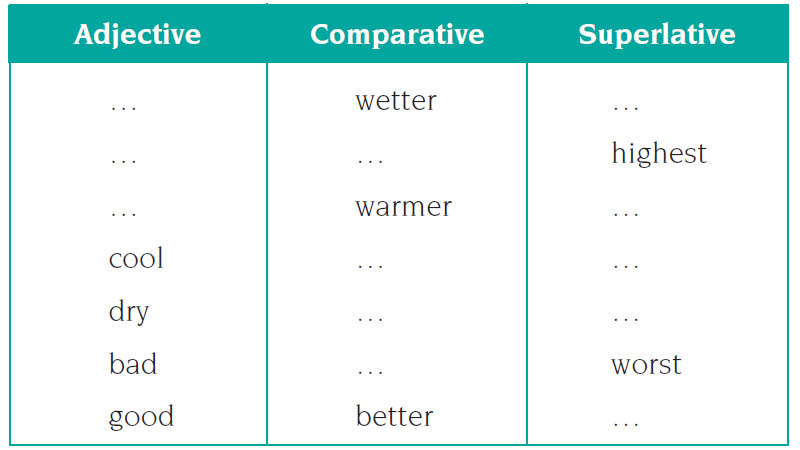Nesta lição, continue a aprender os métodos para falar sobre o clima e o tempo de uma região!
1 . Como é o clima onde você mora? Como você costuma descrever as características das diferentes estações?
2 . Leia os três artigos de jornal a seguir. Se necessário, confira o significado das palavras do quadro abaixo no Word Bank.
crazy | average | on record | experts | bush fire | burn | dangerous | warn
ITALY’S THE HOTTEST PLACE!
Everybody
expects Italy to be hot in July and August. For many people, it’s the
best time to go on holiday. It’s also well known that the south of the
country is always hotter than the north, but this year things are crazy.
In August, the average temperature at noon has been 41°C. It’s the
hottest summer on record. Last Wednesday the temperature reached an
all-time high of 43.8°C.
Eastern Australia burns
Bush
fires are burning up and down the eastern part of Australia. January is
a dangerous month here – it’s always hot and very dry. But this year
has been drier than most. There has been no rain here for eight weeks.
The fires are the worst since January 1994. Experts say the weather conditions are likely to get worse before they get better.
LONDON’S COOKING!
England
in general, and London in particular, is having the hottest summer on
record. Temperatures have stayed in the high 20s and 30s all month. This
is good for anybody selling cold drinks and ice cream – this weather
certainly makes them happy!
However, yesterday, the temperature reached 38.4°C. It’s the highest temperature ever recorded in the UK.
Doctors warned that such high temperatures could be dangerous for children and older people.
Do you know?
A palavra climate se refere às condições do tempo durante todo o ano. Por exemplo, os verões são quentes e secos, e os invernos são suaves e úmidos. Já o weather pode mudar de um dia para o outro.
3 . Ligue as partes para formar frases verdadeiras.
1 The south of Italy is
2 The average noon temperature
3 London’s summer is the
4 Very high temperatures can be
5 Eastern Australia has had
6 Bush fires here are the worst
a) hotter than the north.
b) since January 1994.
c) dangerous for some people.
d) no rain for eight weeks.
e) hottest on record.
f) was 41°C.
Adjetivos comparativos e superlativos
Adjetivos comparativos
Usa-se um adjetivo comparativo + than para comparar duas coisas.
The apples are cheaper than the grapes.
The big oranges are nice but the small ones are cheaper.
Acrescenta-se -r ou -er ao fim de adjetivos curtos para torná-los comparativos.
light → lighter
dark → darker
safe → safer
nice → nicer
Dobra-se a consoante final da maioria dos adjetivos que terminam com uma vogal breve seguida de uma consoante.
hot → hotter
big → bigger
Quando o adjetivo termina em -y, substitui-se o -y pelo -i.
sunny → sunnier
pretty → prettier
Coloca-se more
antes da maioria dos adjetivos longos que não terminam em -y e antes de
adjetivos derivados de verbos, os quais terminam em -ed.
boring → more boring
expensive → more expensive
delighted → more delighted
tired → more tired
Adjetivos superlativos
Usa-se the + adjetivo superlativo para comparar mais de duas coisas ou descrever algo excepcional.
This is my youngest son, Martin.
It was the happiest day of my life.
Para formar o superlativo, acrescenta-se -st ou -est ao fim de adjetivos curtos.
nice → nicest
cold → coldest
Dobra-se a consoante final da maioria dos adjetivos que terminam com uma vogal breve seguida de uma consoante.
hot → hottest
big → biggest
Quando o adjetivo termina em -y, substitui-se o -y pelo -i.
sunny → sunniest
pretty → prettiest
Coloca-se most antes da maioria dos adjetivos longos que não terminam em -y e antes de adjetivos derivados de verbos, os quais terminam em -ed.
boring → most boring
expensive → most expensive
delighted → most delighted
tired → most tired
Adjetivos irregulares
Lembre-se de que alguns adjetivos são irregulares nas formas comparativa e superlativa. Os mais comuns são:
good → better → best
bad → worse → worst
far → further / farther → furthest / farthest
4 . Preencha a tabela abaixo com as palavras apropriadas.

5 . Ouça uma breve descrição do tempo e complete as frases abaixo.
1 The ………… place was Hamburg.
2 The ………… noon temperature was 12 °C.
3 Birmingham was slightly ………… than London.
4 Monte Carlo was the ………… place in southern France.
5 Rome was the ………… place today.
6 It will be ………… tomorrow everywhere.
20 minutes+
Leia as frases abaixo em voz alta. Anote as sílabas das palavras em itálico que você considera mais fortes.
1 Very high temperatures were recorded on the coast today.
2 This is the hottest summer on record.
3 My house is being decorated at the moment.
4 I’m buying some decorations for my daughter’s birthday party.
5 Are you inviting him to the party?
6 I’ve got an invitation to their wedding.
Ouça a gravação para conferir suas respostas.
Word Bank
average (adjetivo) = médio
burn (verbo) = queimar
bush fire (RU)/brush fire (EUA) (substantivo) = queimada
crazy (adjetivo) = louco
dangerous (adjetivo) = perigoso
expert (substantivo) = especialista
record (verbo) = registrar
warn (verbo) = avisar, advertir
Respostas:
Exercício 3
1-a; 2-f; 3-e; 4-c; 5-d; 6-b
Exercício 4
wet | wetter | wettest
high | higher | highest
warm | warmer | warmest
cool | cooler | coolest
dry | drier | driest
bad | worse | worst
good | better | best
Exercício 5
1 coolest
2 lowest
3 cooler
4 warmest
5 hottest
6 wetter
20 minutes+
1 recorded
2 record
3 decorated
4 decorations
5 inviting
6 invitation
 Sair da aula
Sair da aula